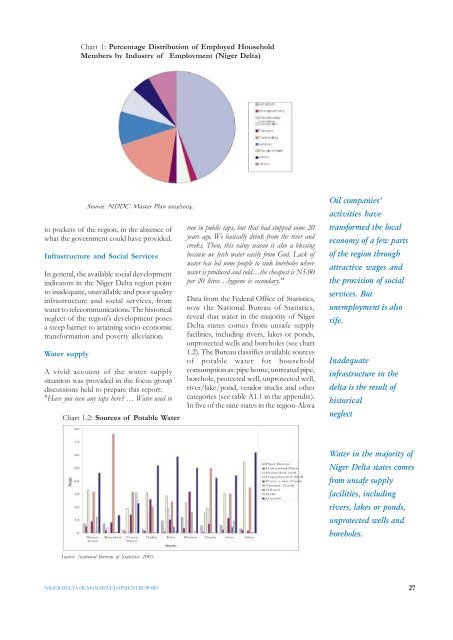Niger Delta Human Development Report - UNDP Nigeria - United ...
Niger Delta Human Development Report - UNDP Nigeria - United ...
Niger Delta Human Development Report - UNDP Nigeria - United ...
You also want an ePaper? Increase the reach of your titles
YUMPU automatically turns print PDFs into web optimized ePapers that Google loves.
to pockets of the region, in the absence of<br />
what the government could have provided.<br />
Infrastructure and Social Services<br />
In general, the available social development<br />
indicators in the <strong>Niger</strong> <strong>Delta</strong> region point<br />
to inadequate, unavailable and poor quality<br />
infrastructure and social services, from<br />
water to telecommunications. The historical<br />
neglect of the region's development poses<br />
a steep barrier to attaining socio-economic<br />
transformation and poverty alleviation.<br />
Water supply<br />
Chart 1: Percentage Distribution of Employed Household<br />
Members by Industry of Employment (<strong>Niger</strong> <strong>Delta</strong>)<br />
Source: NDDC Master Plan 2003/2004.<br />
A vivid account of the water supply<br />
situation was provided in the focus group<br />
discussions held to prepare this report:<br />
"Have you seen any taps here? … Water used to<br />
Chart 1.2: Sources of Potable Water<br />
Source: National Bureau of Statistics 2005.<br />
NIGER DELTA HUMAN DEVELOPMENT REPORT<br />
run in public taps, but that had stopped some 20<br />
years ago. We basically drink from the river and<br />
creeks. Then, this rainy season is also a blessing<br />
because we fetch water easily from God. Lack of<br />
water has led some people to sink boreholes where<br />
water is produced and sold…the cheapest is N5.00<br />
per 20 litres…hygiene is secondary."<br />
Data from the Federal Office of Statistics,<br />
now the National Bureau of Statistics,<br />
reveal that water in the majority of <strong>Niger</strong><br />
<strong>Delta</strong> states comes from unsafe supply<br />
facilities, including rivers, lakes or ponds,<br />
unprotected wells and boreholes (see chart<br />
1.2). The Bureau classifies available sources<br />
of potable water for household<br />
consumption as: pipe borne, untreated pipe,<br />
borehole, protected well, unprotected well,<br />
river/lake/pond, vendor trucks and other<br />
categories (see table A1.1 in the appendix).<br />
In five of the nine states in the region-Akwa<br />
Oil companies’<br />
activities have<br />
transformed the local<br />
economy of a few parts<br />
of the region through<br />
attractive wages and<br />
the provision of social<br />
services. But<br />
unemployment is also<br />
rife.<br />
Inadequate<br />
infrastructure in the<br />
delta is the result of<br />
historical<br />
neglect<br />
Water in the majority of<br />
<strong>Niger</strong> <strong>Delta</strong> states comes<br />
from unsafe supply<br />
facilities, including<br />
rivers, lakes or ponds,<br />
unprotected wells and<br />
boreholes.<br />
27










